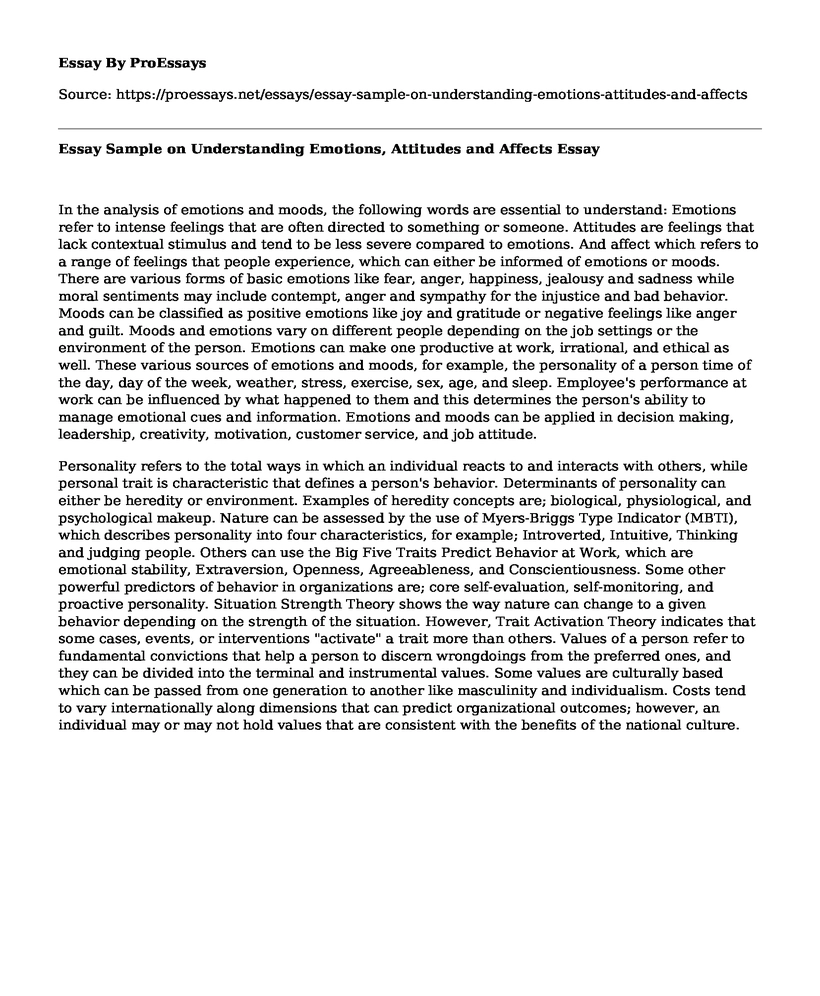In the analysis of emotions and moods, the following words are essential to understand: Emotions refer to intense feelings that are often directed to something or someone. Attitudes are feelings that lack contextual stimulus and tend to be less severe compared to emotions. And affect which refers to a range of feelings that people experience, which can either be informed of emotions or moods. There are various forms of basic emotions like fear, anger, happiness, jealousy and sadness while moral sentiments may include contempt, anger and sympathy for the injustice and bad behavior. Moods can be classified as positive emotions like joy and gratitude or negative feelings like anger and guilt. Moods and emotions vary on different people depending on the job settings or the environment of the person. Emotions can make one productive at work, irrational, and ethical as well. These various sources of emotions and moods, for example, the personality of a person time of the day, day of the week, weather, stress, exercise, sex, age, and sleep. Employee's performance at work can be influenced by what happened to them and this determines the person's ability to manage emotional cues and information. Emotions and moods can be applied in decision making, leadership, creativity, motivation, customer service, and job attitude.
Personality refers to the total ways in which an individual reacts to and interacts with others, while personal trait is characteristic that defines a person's behavior. Determinants of personality can either be heredity or environment. Examples of heredity concepts are; biological, physiological, and psychological makeup. Nature can be assessed by the use of Myers-Briggs Type Indicator (MBTI), which describes personality into four characteristics, for example; Introverted, Intuitive, Thinking and judging people. Others can use the Big Five Traits Predict Behavior at Work, which are emotional stability, Extraversion, Openness, Agreeableness, and Conscientiousness. Some other powerful predictors of behavior in organizations are; core self-evaluation, self-monitoring, and proactive personality. Situation Strength Theory shows the way nature can change to a given behavior depending on the strength of the situation. However, Trait Activation Theory indicates that some cases, events, or interventions "activate" a trait more than others. Values of a person refer to fundamental convictions that help a person to discern wrongdoings from the preferred ones, and they can be divided into the terminal and instrumental values. Some values are culturally based which can be passed from one generation to another like masculinity and individualism. Costs tend to vary internationally along dimensions that can predict organizational outcomes; however, an individual may or may not hold values that are consistent with the benefits of the national culture.
Cite this page
Essay Sample on Understanding Emotions, Attitudes and Affects. (2023, Mar 26). Retrieved from https://proessays.net/essays/essay-sample-on-understanding-emotions-attitudes-and-affects
If you are the original author of this essay and no longer wish to have it published on the ProEssays website, please click below to request its removal:
- Maladaptive Behavior Case Study
- How Aging, Ethnicity, Life Situations, and Disease Affect Person and Health as an Aging Adult
- Family Life Education Programs Addressing Socioemotional Topic Essay
- Research Paper on Biological Methods Used to Treat Schizophrenia
- Aging: Physical, Biological & Mental Changes in Middle Age - Essay Sample
- Essay on Social Media Normalizing Hate: Balancing Freedom and Responsibility
- Essay Example on Freud's Impact: Shaping Psychology of Today







